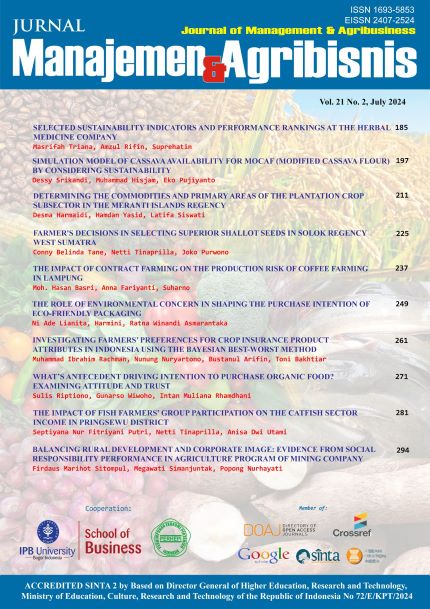The Role of Environmental Concern in Shaping The Purchase Intention of Eco-Friendly Packaging
Abstract
Background: Highlight the importance of emphasizing the necessity of utilizing environmentally benign packaging materials, particularly given the mounting environmental concerns primarily attributed to the alarming rate of plastic waste production.
Purpose: The study aims to analyze the factors that influence Generation Z consumers’ intention to purchase products with eco-friendly packaging and identify strategies that can be employed to enhance this intention.
Design/methodology/approach: A path analysis was performed using Partial Least Square with Structural Equation Modeling (PLS-SEM).
Findings/Result: The research findings indicate that environmental concerns, support for the policy, perceived behavioral control, attitude, and subjective norm positively and significantly influence the increased intention to purchase Generation Z products with eco-friendly packaging. Environmental concern and perceived behavioral control are pivotal in fostering increased purchase intention for these products. Environmental concerns strongly influence intentions to purchase eco-friendly packaged products, leading Generation Z to demand more. This phenomenon reflects consumer trends; stakeholders need involvement to encourage sustainable actions and achieve environmental sustainability, especially among young people.
Conclusion: It could be concluded that environmental concern plays a pivotal role in Generation Z's intention to purchase products with eco-friendly packaging. This concern influences various aspects of the Theory of Planned Behavior, guiding consumers toward more sustainable choices. The findings indicate that a higher level of environmental concern is associated with a greater intention to select eco-friendly packaging. Therefore, stakeholders must enhance environmental awareness among Generation Z, as they will play a pivotal role in the future of environmental sustainability development. Integrating eco-friendly practices into campus environments and business strategies will help meet this demand and support the shift toward more sustainable consumer behavior.
Originality/value (State of the art): This study uses an extended variant of the TPB with a research focus different from previous studies. Previous empirical studies such as Paul et al. (2016), Chaudhary & Bisai (2018), and Asih et al. (2020) focused on green products. In contrast, this study focuses on products with eco-friendly packaging. Paul et al. (2016) integrated the TPB model with environmental concern to examine its influence on purchase intention of green products in India, while Chaudhary & Bisai (2018) combined the TPB model with environmental concern to examine its influence on purchase intention and willingness to pay premium, and tested the moderation effect between purchase intention and green purchasing behavior in India. Asih et al. (2020) integrated the TPB model with environmental concern and environmental knowledge to examine interest in using green products. However, this study integrates environmental concern and policy to support the TPB model, examine the factors influencing Generation Z’s purchase intention toward products with eco-friendly packaging, and identify strategies to increase Generation Z’s intention to purchase.
Keywords: environmental concern, green products, purchase intention, PLS-SEM, theory of planned behavior
Authors
Authors who publish with this journal agree to the following terms:
- Authors retain copyright and grant the journal right of first publication with the work simultaneously licensed under a Creative Commons Attribution License that allows others to share the work with an acknowledgement of the work's authorship and initial publication in this journal.
- Authors are able to enter into separate, additional contractual arrangements for the non-exclusive distribution of the journal's published version of the work (e.g., post it to an institutional repository or publish it in a book), with an acknowledgement of its initial publication in this journal.
- Authors are permitted and encouraged to post their work online (e.g., in institutional repositories or on their website) prior to and during the submission process, as it can lead to productive exchanges, as well as earlier and greater citation of published work (See The Effect of Open Access).

